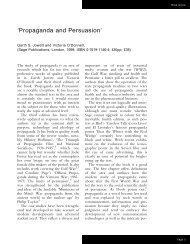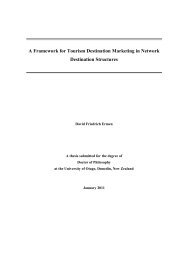Who sets the agenda? - Dr Phil Harris
Who sets the agenda? - Dr Phil Harris
Who sets the agenda? - Dr Phil Harris
Create successful ePaper yourself
Turn your PDF publications into a flip-book with our unique Google optimized e-Paper software.
European<br />
Journal of<br />
Marketing<br />
35,9/10<br />
1132<br />
of a specific issue, do not subsequently manage to adapt <strong>the</strong> overall press<br />
<strong>agenda</strong> to <strong>the</strong>ir specific priorities. The difference between <strong>the</strong> public and <strong>the</strong><br />
press <strong>agenda</strong>s is not entirely consistent with studies in o<strong>the</strong>r national settings,<br />
but it may be evidence to suggest that <strong>the</strong> public does not necessarily respond<br />
to <strong>the</strong> press <strong>agenda</strong> and, that if <strong>the</strong>y do converge, <strong>the</strong> movement may be from<br />
ei<strong>the</strong>r side.<br />
We tentatively link <strong>the</strong> divergence between <strong>the</strong> parties’ and <strong>the</strong> public<br />
<strong>agenda</strong>s to making <strong>the</strong> electorate feel isolated and ignored by its political<br />
leaders and thus become dissatisfied with <strong>the</strong> political system and <strong>the</strong> parties<br />
(first <strong>the</strong> <strong>agenda</strong>s diverge, <strong>the</strong>n comes <strong>the</strong> disenchantment); this is a matter of<br />
concern in many democracies. There are however, o<strong>the</strong>r, though not necessarily<br />
mutually exclusive, explanations. First, <strong>the</strong> need to keep party activists content<br />
plays a significant role in <strong>the</strong> construction of political manifestos and o<strong>the</strong>r<br />
messages. Second, <strong>the</strong> need to construct distinct market positions may lead to<br />
different emphases on issues and, at least in <strong>the</strong> short term, a party’s<br />
positioning strategy has to be reasonably consistent with voters’ perceptions.<br />
Finally, <strong>the</strong> campaign strategy literature emphasis on issue ownership and<br />
parties sticking to <strong>the</strong>ir own issue territory may actually inhibit <strong>agenda</strong><br />
adaptation. It offers little guidance to parties or candidates who fall behind in<br />
campaigns. We now have good models of <strong>the</strong> <strong>agenda</strong>-setting process. What<br />
appears to be needed at this point are <strong>the</strong>ories on which to base campaign<br />
strategies which are capable of adapting and responding as events unfold.<br />
References<br />
Allen, R.L. and Izcaray, F.C. (1988), ``Nominal <strong>agenda</strong> diversity in a media-rich, less-developed<br />
society’’, Communication Research, Vol. 15 No. 1, pp. 29-50.<br />
Ansolabehere, S. and Iyengar, S. (1994), ``Riding <strong>the</strong> wave and claiming ownership over issues:<br />
<strong>the</strong> joint effects of advertising and news coverage in campaigns’’, Public Opinion Quarterly,<br />
Vol. 58, pp. 335-57.<br />
Ansolabehere, S., Behr, R. and Iyengar, S. (1991), ``Mass media and elections: an overview’’,<br />
American Politics Quarterly, Vol. 19 No. 1, pp. 109-39.<br />
Asp, K. (1983), ``The struggle for <strong>the</strong> <strong>agenda</strong>: party <strong>agenda</strong>, media <strong>agenda</strong> and voter <strong>agenda</strong> in<br />
<strong>the</strong> 1979 Swedish election campaign’’, Communication Research, Vol. 10 No. 3, pp. 333-55.<br />
Becker, L.B. (1977), ``The impact of issue saliences’’, in Shaw, D.L. and McCombs, M.E. (Eds), The<br />
Emergence of American Political Issues: The Agenda-Setting Function of <strong>the</strong> Press, West<br />
Publishing Co, St Paul, MN, pp. 121-31.<br />
Benton, M. and Frazier, P.J. (1976), ``The <strong>agenda</strong>-setting function of <strong>the</strong> mass media at three levels<br />
of `information-holding’’’, Communication Research, Vol. 3, pp. 261-74.<br />
Bowers, T.A. (1977), ``Candidate advertising: <strong>the</strong> <strong>agenda</strong> is <strong>the</strong> message’, in Shaw, D.L. and<br />
McCombs, M.E. (Eds), The Emergence of American Political Issues: The Agenda-Setting<br />
Function of <strong>the</strong> Press, West Publishing Co, St Paul, MN, pp. 53-67.<br />
Brosius, H.-B. and Kepplinger, H.M. (1992), ``Beyond <strong>agenda</strong>-setting: <strong>the</strong> influence of partsanship<br />
and television reporting on <strong>the</strong> electorate’s voting intentions’’, Journalism Quarterly,<br />
Vol. 69 No. 4, pp. 893-901.<br />
Campbell, A., Converse, P.E., Miller, W.E. and Stokes, D.E. (1966), Elections and <strong>the</strong> Political<br />
Order, John Wiley and Sons, New York, NY.




